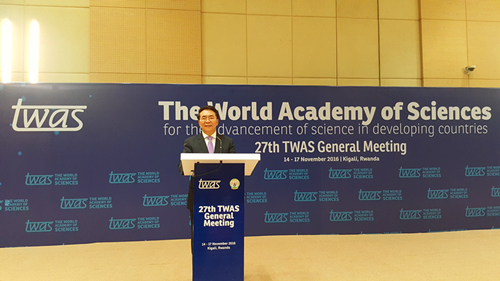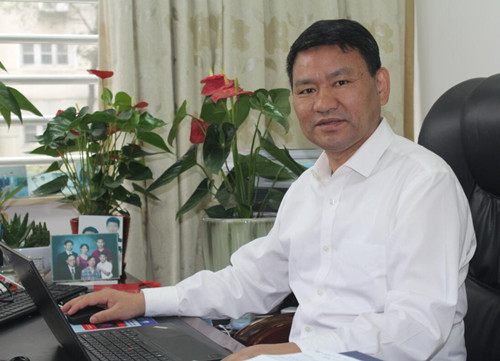The 27th General Meeting of the World Academy of Sciences for the Advancement of Science in Developing Countries (TWAS) raised its curtain in Kigali, Rwanda, on November 14, 2016. Forty new TWAS fellows were elected at the meeting, among whom 12 were Chinese scientist. Prof. Tan Weihong from Hunan University (HNU) was among the list.

Bai Chunli, president of TWAS Council, and president of the Chinese Academy of Science (CAS), addresses the opening ceremony.
The TWAS academicians cover ten scientific fields, including mathematics, physics, chemistry, astronomy, geoscience, biology, agriculture, medicine, engineering, sociology, and economics. The new selected fellows included four chemical scientists.
TWAS, founded in November 1983, is headquartered in Trieste, Italy. It is an international non-government, non-political, and non-profit science academy, aiming to promote scientific research in developing countries.
TWAS selects fellows from the scientific academies, national research councils, universities, and research institutions of developing countries, as well as scientific organizations of developed countries. The fellows are some of the world’s most accomplished scientists and engineers, who have made remarkable contributions to developing countries’ scientific research in their fields.

Tan Weihong: (from twas.org)
PhD, Distinguished Professor and Director, State Key Laboratory of Chemo/Biosensing and Chemometrics, and Distinguished Professor, University of Florida; Hunan University, Changsha, Hunan, China.
The nominee has made pioneer contributions in bioanalytical chemistry and chemical biology. He developed a cell-based aptamer selection technology to generate molecular probes for cellular sample recognition. He also pioneered aptamer based biomarker discovery and detection. Member of the Chinese Academy of Sciences, he has received the National Natural Science Award several times, the American Chemical Society Florida Award for Outstanding Contributions to Chemical Sciences, the Packard Science and Technology Award and the Whitaker Foundation Biomedical Engineering Award, among others.
